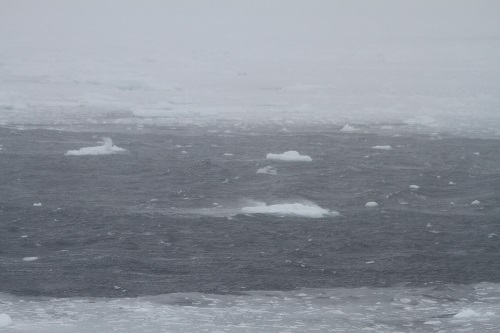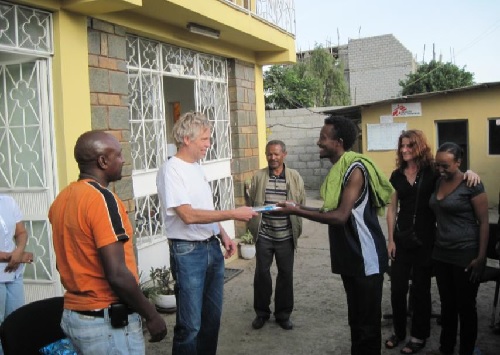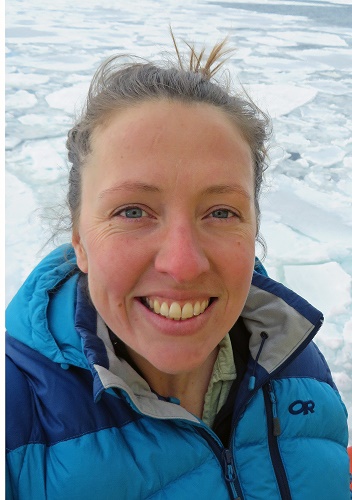Update
It’s funny how quickly the weather can change here. Just overnight it went from sunny and relatively warm-ish to snowing, foggy, and -30F with 60+mph winds. I was going to go outside today, but when I couldn’t push the door open against the wind I figured I should just take photos through a window instead. The winds may be too high for us to get in the CTDs that were planned, but hopefully we can get some good mapping in.
 High winds, snow, and cold weather on the Southern Ocean.
High winds, snow, and cold weather on the Southern Ocean.
Meet the Science Support
It takes a lot of people to make the science happen down here. The scientists could not do their work without the amazing support from the officers, crew, and technicians on board. The officers and crew of the ship, led by Captain Souza, keeps us safe and comfortable, expertly guiding us through the waters and sea ice. They keep the ship in amazing condition and keep us well fed (thank you Mike, Michael, and Lorenzo). In general, they make the NBP one of the best research ships to sail on.
There science support staff are the ones that make sure the science happens. These people take care of all of the logistics and the mechanical, electrical, and IT equipment on board. They build things the science team needs to complete their work, maintain the labs, fix the infrastructure on the ship and just generally keep things running.
Let’s meet a few of the people who make the research possible (and then we’ll meet more tomorrow).
Marine Projects Coordinator
The Marine Projects Coordinator (MPC) is the head of logistics and operations on the ship. They organize all of the human and technical resources needed to support the science research. The MPC coordinates everything (literally everything from getting us through customs to ordering fuel to acting as a liaison between the crew and the scientists) needed to help the scientists accomplish their research with the support of the staff and crew.
Al Hickey—Marine Projects Coordinator
 Marine Projects Coordinator, Al Hickey, 2nd from the left, saying goodbye to friends in Ethiopia. Photo courtesy of Al Hickey.
Marine Projects Coordinator, Al Hickey, 2nd from the left, saying goodbye to friends in Ethiopia. Photo courtesy of Al Hickey.
Al grew up on the water. What he started off worked towards a degree in music, he eventually ended up with a degree in Marine Biology. While working in a marina after college a NOAA research vessel came to dock and he was given a tour. He applied for a job while still on the ship and two weeks later had a job. Al has worked on all kinds of ships and boats, and through his networks in the community he eventually ended up working as an Antarctic Support Contractor—fulfilling a college dream to head to Antarctica.
To Al, it’s the people that make the job. He enjoys that each trip he goes on is different, with different things to do, to see, and to learn. There are always new, incredible and talented people he gets to work with. He definitely enjoys the fast paced life on the ship, where things are always moving.
When not the ship, Al also lends his considerable skills to Doctors without Borders.
Advice from Al: If there’s something you want to do, there’s a way to do it.
Marine Lab Technician
The Marine Lab Technician (MLT) oversees all of the many labs on board—maintaining equipment, assisting in operations, disposing of hazardous lab waste, and ensuring all of the samples taken aboard make it back to the US.
Amy Westman – Marine Lab Technician and Emergency Medical Technician
 Marine Lab Technician Amy Westman, photo courtesy of Amy Westman.
Marine Lab Technician Amy Westman, photo courtesy of Amy Westman.
It’s been Amy’s lifelong dream to become an oceanographer and she’s always had a fascination with Antarctica. She sailed on tall ships for a few years after college and loves being on the water. She started working in Antarctica four years ago after finishing her Master’s degree in Oceanography.
Her favorite part about working Antarctic research cruises is the people she meets (and the penguins). Everyone that is here wants to be here and is excited about being part of Antarctic science which makes for a great working environment. The ship becomes a very tight knit community and you know your coworkers like family—when they’re at their best and worst.
Amy’s favorite memories from her trips include tagging emperor penguins and seeing the southern lights.
Advice from Amy: You don’t have to settle, you can find something you love to do and get paid to do it.
Marine Technicians
The Marine Technicians (or MTs) take care of all of the logistics of science operations on vessel. They conduct the deployments and recoveries of all of the equipment (like our CTDs and cores), run the boats (like zodiacs), and are the general handy-women of the ship—building and repairing anything needed on board.
MacKenzie Haberman—Marine Technician
 Marine Technician MacKenzie Haberman, photo courtesy of MacKenzie Haberman.
Marine Technician MacKenzie Haberman, photo courtesy of MacKenzie Haberman.
Although always interested in science, MacKenzie started off as an Art History major and loved it. She was well on her way to a career, interning at the MOMA, when she did a study abroad program called SEA Semester. This opened her eyes to the world of experimental learning. Upon returning from her semester abroad she began working for SEA Semester in the engine room. Why the engine room? Because it was something she had never done before. After working on ships in a variety of places to gain experience, she got a job here on the R/V Nathaniel B. Palmer.
MacKenzie loves being on the cutting edge of science. She loves getting to be a part of experiments from all different fields, getting to talk with leading experts and getting a first-hand view of the bigger picture. She also loves that she gets to work with a close knit group of people (friends, really) in an extreme environment where every day is different.
MacKenzie also loves pickles. A lot. One time she ate an entire five gallon jar of pickles in one sitting.
Advice from MacKenzie: Your education is your own responsibility. Make an effort to learn things you don’t know and you’ll have amazing adventures because of it. Find something new and learn it.
Meredith Helfrich—Marine Technician and Emergency Medical Technician
 Marine Technician Meredith Helfrich, photo courtesy of Meredith Helfrich.
Marine Technician Meredith Helfrich, photo courtesy of Meredith Helfrich.
Meredith comes from a boating background, having worked for SEA Education Association and Outward Bound. From that community she learned about the opportunities on the R/V Nathaniel B. Palmer, so she applied for the chance to go someplace cool (figuratively and literally) and help with higher level science.
Being a Marine Technician in the middle of nowhere, with limited email access, means doing a lot of problem-solving and trouble-shooting—something Meredith enjoys. She loves making the science happen on the ship and the unique work environment both Antarctica and the ship provide. She gets to work closely with the people she lives with and go places no one has ever been before.
Meredith brings a hula hoop on board with her as well as costumes. She always tries to find ways to keep it fun out here.
Advice from Meredith: You don’t have to know what you want to be when you grow up. There’s always something new out there.
Krista Tyburski—Marine Technician
 Marine Technician Krista Tyburski, photo by Krista Tyburski.
Marine Technician Krista Tyburski, photo by Krista Tyburski.
Krista has been working on boats since graduating high school, and has an amazing amount of experience in professional sailing and piloting boats. After learning as she worked and gaining a variety of skills, she decided Antarctica seemed like the next logical step—the next big adventure.
She enjoys using the skills she has on the ship—it takes a lot of skill to be a Marine Technician since they are the support out here. Krista loves getting out and experiencing Antarctica and doing it all in a close community of co-workers and friends.
When she’s not on the ship, Krista enjoys making stained glass.
Advice from Krista: Travel as much as possible. Get out and experience everything.
Meet more of the support team tomorrow!


Comments